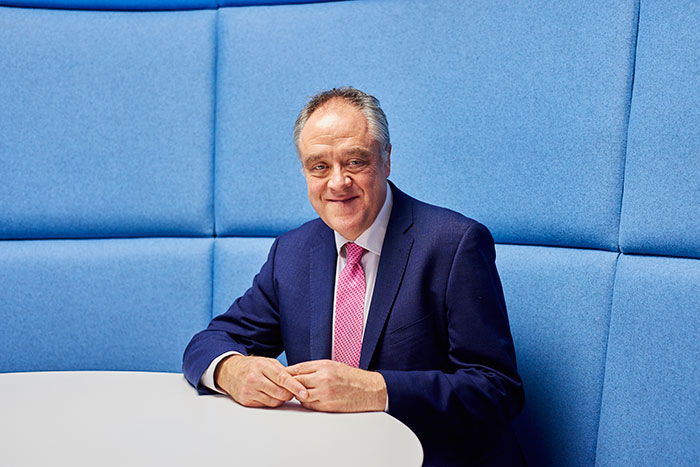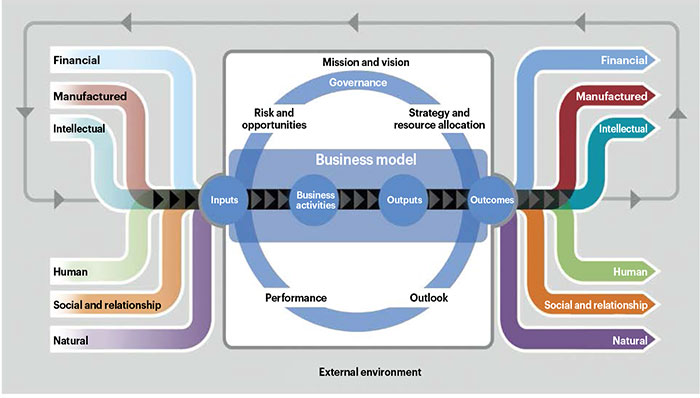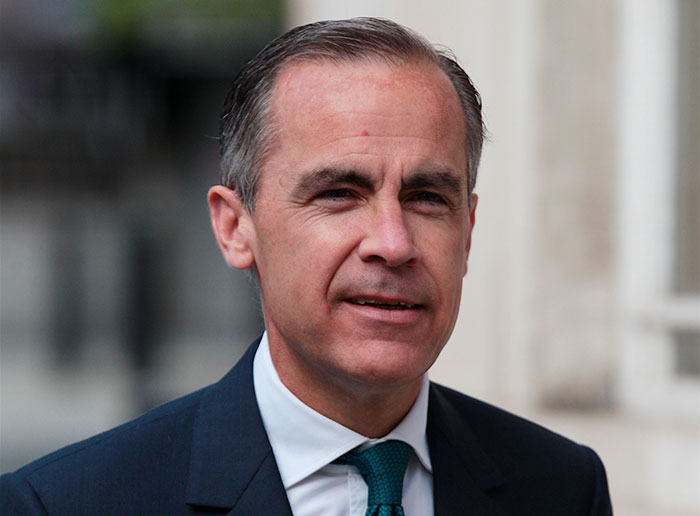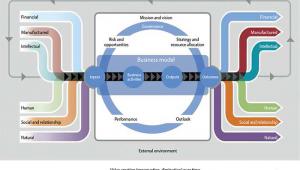Moving jobs from Brussels to London, Richard Howitt is probably something of a trendsetter. But, while many Brits are likely to leave Europe because of Brexit, Howitt’s reason is different. The former MEP came home in November to head the International Integrated Reporting Council (IIRC), which is at the forefront of developing and expanding the use of Integrated Reporting <IR>.

Richard Howitt at the IIRC's London offices. Photo: Tom Watkins
Here, Howitt truly is a trailblazer. As a council leader in the early 1990s, he spearheaded some groundbreaking work assessing local government’s environmental impact and subsequently led the European Parliament’s work on corporate responsibility for 20 years. He was also a key architect of the 2014 EU Non-Financial Reporting Directive that harmonised regulations around such schemes.
This work saw him invited to the Prince of Wales’ Accounting for Sustainability conference at St James’s Palace in 2009, which started a movement to consider how to account for businesses’ wider impacts. Out of this, the IIRC was formed the next year, initially as the International Integrated Reporting Committee, to lead the development of a reporting mechanism that aligned financial decisions and corporate behaviour with the wider goals of economic stability and sustainable development.
When its first chief executive Paul Druckman said he was stepping down last year, Howitt – an ambassador for the IIRC from the outset – could not resist the post. He says: “I wasn’t in any way looking for a job, but this is for me the world’s plum job.”
Since those early days, Howitt says there has been widespread acceptance of the need to account for value creation in both the public and private sectors. Integrated reporting calls for organisations to report on their work against six capitals – financial, manufacturing, human, social and relationship, intellectual, and natural – to get a more complete view of their impact on those around them.

Assessing how organisations create value using the six capitals is key to integrated reporting
Considering the steps made since the IIRC’s foundation, Howitt tells PF at the organisation’s London headquarters that there has been “remarkable progress but a huge way still to go”.
“The remarkable progress is that it is widely acknowledged and the awareness is incredible. If you talk to leading people in business, in public and other organisations that deal with finance, people know about integrated reporting. There is an acceptance that it is the future, that it is inevitable – people who don’t do it today say this is something that will happen, and it is a good thing,” he says.
“People get that we are living in a world where short-termism has its costs and where we have to be more aware not just of financial results but of people and planet too. That case I think has been made and accepted very widely. The next phase is not just for awareness and recognition – it is for adoption.”
He is coming to the organisation as it is poised for a global implementation drive for <IR>. Under plans developed by the IIRC, 2017 will be the final year of a “breakthrough” phase of raising awareness about reporting on organisational value on an integrated basis. From 2018, the primary focus will shift to global adoption, and a push for <IR> to become, in Howitt’s words, “the world norm”.
That is not to say that there has been no implementation so far. According to Howitt, as many as 1,500 companies and organisations are already practising integrated reporting. These include organisations such as the World Bank and, in the UK, the Crown Estate (public sector) and United Utilities (private sector). Multinationals such as General Electric and ArcelorMittal are also on board.
Recent months have seen an increased focus on the development of <IR> for the public sector, with CIPFA producing a guide – in collaboration with the IIRC and sponsored by the World Bank – on adoption.
Gillian Fawcett, the head of governments faculty at CIPFA, has said integrated reporting makes it possible to interpret huge organisational complexity and interconnectedness. This makes it a good fit for the public sector, Fawcett has stated.
“It gives public organisations the opportunity to demonstrate the real value they bring with very limited resources,” she told PF International last September.
Howitt agrees, and highlights an example from his time as leader of Harlow council in Essex, which he led from 1992 to 1994 before becoming an MEP, as evidence of where it could make a difference.
At Harlow, Howitt was ahead of the curve in getting the authority to produce a state of the environment report. “I’m very proud that we did that,” he says. “But we had one lot of people doing that and then a different lot of people working on the draft budget each year, and there wasn’t a link between the two.
“Obviously, I didn’t even consider that at the time, but now we can see that however worthy that environmental sustainability information is – and it is – it is only as valuable as how it is used. And the whole principle of integrated reporting would have benefited my council back then.”
He is keen to highlight that not every organisation will report against each capital – “it is a framework for organisations to work out what is material for them” – but says all public sector organisations would recognise examples of interconnectivity, such as the costs of a council’s recycling and landfill to its bottom line.
“In terms of the six capitals, it is not just financial – the other capitals have a financial impact,” he says.
“This is one of the areas where I would challenge every public sector organisation reading this: your organisation’s financial results are as impacted by how it deals with these other capitals just as much as any private sector organisation. You know if you get it wrong in relation to your people or your community, you’re going to suffer. This is a means and approach that will enable you to make sure you don’t get it wrong but that you get it right to the benefit of everyone.”
It is, however, an inauspicious time to be promoting a new global reporting regime. Howitt acknowledges that at a time of global upheaval – from Brexit to migration to the election of Donald Trump and to presidential impeachment in Brazil – it can feel that public organisations, from the local to the supranational, are always dealing with the next crisis.
The 2008 global financial crash hit both public sector budgets and trust, which has helped feed these phenomena, he says.
What are the shared trends, and how can <IR> help?
“I agree that there are lessons to learn across all of these countries, and wider, on a thirst from the public for greater acountability, scrutiny and transparency, and I think the public sector feels that. Ever since the banking crisis of 2008, there has been a plummeting of trust, and the biggest deficit is not a financial one but one of trust, of confidence,” he says.
“And it is the public sector that suffers from financial instability. Integrated reporting is the way to get the system to sort out its act in terms of stability and then to demonstrate that to the wider public, who public sector authorities are ultimately accountable to, and to restore that trust.”
This requires an acknowledgement of the need for integrated thinking in organisations, and Howitt urges people not to view <IR> as just another crisis response, but instead as a way to help unite different projects and priorities.
He cites global development initiatives as examples of where it can have cross-cutting benefits.
“A public organisation sees the global Sustainable Development Goals. But then later on it sees the Paris agreement on climate change, and earlier there were all the problems of the financial crisis.
“If every time there is just a lurch to respond to the latest crisis, that is still short-term thinking. Just because we’ve got the Paris agreement, does that mean the Sustainable Development Goals are less important? No, but for hard-pressed people working in the public sector they’re going to be worrying – because how can you do everything?
“What integrated reporting says is not ‘oh here’s another thing you can do’. We want to help you decide what is really relevant to you then help you to be able to do it. And actually then you will be hitting all of these objectives, not just the one of them that happens to be the latest fad. That is what the principle of integration is about.”
As the IIRC prepares for 2018’s implementation push, this year offers a critical chance to boost global acceptance of <IR>. It is set to be discussed at this year’s G20 summit in Germany as part of the development of climate-related financial disclosure by the group’s Financial Stability Board, which is chaired by Bank of England governor Mark Carney.

Photo: Shutterstock
Even this takes the IIRC and Howitt back to the organisation’s roots. Carney was an early, enthusiastic backer of <IR>, and believes it can lead to better-informed and more sustainable long-term investment to benefit society.
“That is going to go to the G20 and that means these issues are really going to come centre stage in 2017 at the world level,” Howitt concludes. “Integrated reporting is going to get a platform and a shining light on it, and I intend to use that very much to advance this move towards global adoption.”
All eyes will be on Hamburg in July for the next step in the development of <IR>, which has gone from St James’s Palace to the world stage in less than a decade.




















